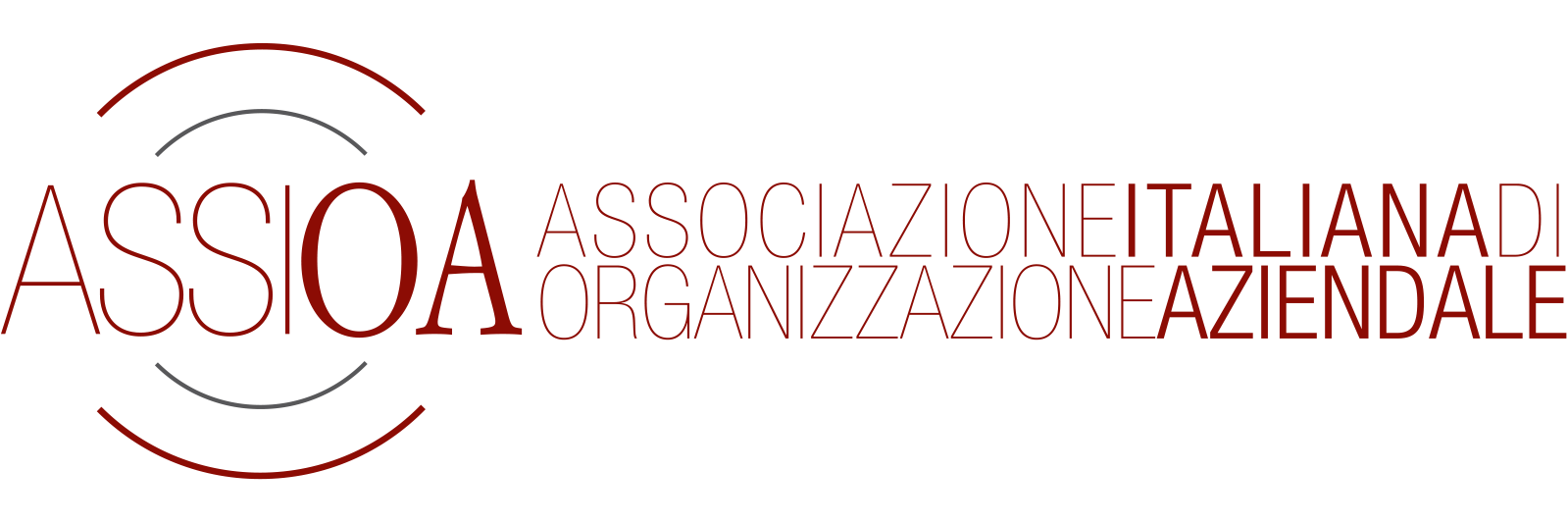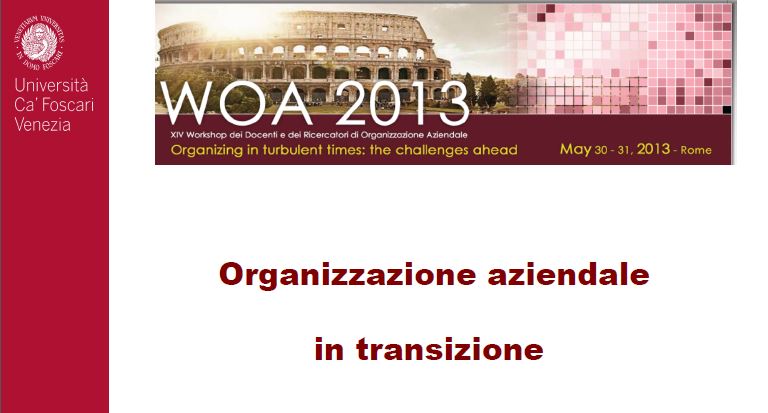2013 – Organizing in turbulent times: the challenge ahead
Scientific Committee
- Gatti Mauro Sapienza Università di Roma (Chair)
- Adinolfi Paola Univ. di Salerno
- Buonocore Filomena Univ. Parthenope – Napoli
- Casalino Nunzio Univ. Marconi – Roma
- Di Guardo Maria Chiara Univ. di Cagliari
- Fabbri Tommaso Univ. di Modena e Reggio Emilia
- Favretto Giuseppe Univ. di Verona
- Gianecchini Martina Univ. di Padova
- Marchiori Michela Univ. Roma Tre
- Moschera Luigi Univ. Parthenope – Napoli
- Rossignoli Cecilia Univ. di Verona
- Soda Giuseppe Univ. Bocconi – Milano
Tracks
1. Organizational Behaviour and Human Resources Management
Chairs: Filomena Buonocore (Univ. Parthenope) – Martina Gianecchini (Univ. Padova)
Organizational behaviour is a field of study that investigates individual attitudes and behaviour in an organisational context. It is an interdisciplinary field that includes the contribution of many perspectives (e.g. sociology, anthropology, psychology, communication, and management) to understand human behaviour at work. By definition, organizational behaviour is both research and application oriented and it considers three basic levels of analysis, individual, group and organization. Organizational behaviour complements the academic studies of human resource management, including policies and practices impacting on employees’ acquisition, development, retention and productivity. In this Track we address the issues related to organizational behaviour and human resources management, welcoming papers that adopt a theoretical, empirical and/or methodological perspective. Furthermore, the Track encourages submissions that are consistent with the conference theme: “Organizing in turbulent times.” The WOA conference theme reflects significant questions about the relevance of people management given recent economic and financial crises, austerity and unemployment. Thus, some emerging issues regard reliability, flexibility, change management, diversity and productivity in organizational contexts characterized by few resources and short-term planning. Contributions may address but are not limited to the following topics:
- Personality and individual differences
- Work motivation
- Decision making
- Rewards systems
- Psychological contracts
- Organisational justice
- Performance and counter-performance (organisational citizenship behaviour, retaliation in organisations)
- Leadership
- Groups and group processes
- Design of work
- Organisational culture
- Flexible work arrangements
- Employees’ well-being
- International human resource management
- Reliability of HRM processes (e.g. recruiting and selection, training and development, evaluation, compensation, industrial relations)
- People management in changing organization
2. Public Sector and Health Care
Chairs: Paola Adinolfi (Univ. Salerno) – Nunzio Casalino (Univ. Marconi)
Public organizations in many countries are having to deal with tightening finances and growing demands. Traditional governance and management tools are proving inadequate to deal with the challenge of providing better quality services, with fewer resources. This track aim to focus on strategic, organizational and managerial issues in public organizations, in order to provide an answer to the following research questions:
- Are traditional approaches to public management suitable to contemporary contexts? Which planning, programming and budgeting models could be revisited in order to improve both effectiveness and efficiency?
- What innovative organizational and managerial approaches could be adopted to strengthen the competitiveness of public organizations?
- Can the pursuit of efficiency be combined with the pursuit of effectiveness? Is there a trade-off between cost and quality?
The challenges presented by the financial and economic crisis could be also an opportunity for Public Administration to better understand and improve its fundamental role in the next years. The track focuses on the importance of performance evaluation of public organizations to enhance civil servants commitment for citizen-centric services and change their approach in the design, monitoring and implementation of policies in response to the current crisis and its potential worsening. Both qualitative and quantitative research methods are welcome. Conceptual papers that provide deep insight into the organizational issues and criticalities of public organizations are also welcome. Contributions may address but are not limited to the following topics:
- Organization theories & public administration performances
- Public-private collaboration
- Public governance and new public management
- Organizational impact of government reform in the health care sector
- Performance measurement innovation: tools and measurement for the health care and tourism sectors
- Public administration procurement
- Health care sector and performance improvement
- Effective and efficient health care services through processes of innovation and performance management
- Methods and tools for public organizations management
- Civil servants management and services administration
- Knowledge management systems and open data best practices
- The role of public institutions in tourism innovation systems
- Public sector support and involvement in entrepreneurship and innovation
- Inter-institutional collaborating networks
- Public administration and event management
- Public administration and cultural heritage management
- Chaos theory and system theory in public administration
- The role of networks in public project management
- Public information systems & performances
- Managing citizen expectations of public service performance
A short list of papers accepted in this track will be selected for publication in a special issue of an International Journal
3. Organization & Management Theory, Design and Change
Chairs: Michela Marchiori (Univ. Roma Tre) – Giuseppe Soda (Univ. Bocconi)
Organizational and Management Theory involves building theories about organizations, organizing and their application to managerial practices. Design and organizational change are central issues of organizational studies that, from the beginning, address the investigation of criteria to interpret the variability of organizational action. The mainstream is represented by the contingency approach, which has had, since the 60s of the last century, a decisive influence on the production of theories and normative indications for managers. Critiques and attempts to go beyond the traditional approach have been formulated by studies that, adhering to the contingent approach, introduce new variables to improve the ability of analysis and interpretation of reality, as well as by studies that, starting from alternative concepts of organization, rationality, uncertainty, offer new ways of understanding the design, coming to “dissolve the idea of organizational design”. The XIV WOA is an important opportunity to highlight the state of art of the research produced by the Italian scientific community on these issues and its role in the international scenario. The track aims to offer an overview of research’ trends and trajectories in this field.
The track welcomes paper, work-in-progress and early-stage research projects to discuss:
- research topics addressed
- theoretical approaches adopted
- methodologies
- epistemological choices and research design.
Topics include, but are not limited to:
- Development of new theories
- Meanings and ways of understanding organizational design and organizational change
- Contents of organizational design at different levels of analysis and intervention: macro (the relationship between firm and society, relations between firms), meso (formal configurations and processes), micro (job design)
- Design approaches and changes of approaches
- Tools, techniques and variables used in organizational design
- Relationship between rationality, uncertainty and organizational design
- Time and creativity as dimension of organizational design
- Influences on the choices of organizational change and organizational design: key players, the role of the regulatory environment
- Organizational restructuring
- Corporate governance and organizational control.
4. Information Systems, Technology and Innovation Management
Chairs: Maria Chiara Di Guardo (Univ. Cagliari) – Cecilia Rossignoli (Univ. Verona)
In times when technology constantly unfolds new business opportunities and markets rapidly move ahead to new horizons, firms must keep up with the pace of change by defining the most fruitful strategies to gain competitive advantage over their competitors. As Brown and Eisenhardt (1995: 344) point out, “[innovation] is among the essential processes for success, survival and renewal of organizations, particularly for firms in either fast- paced or competitive markets”. Recent works provide evidence on how opening the firm’s boundaries may be used to extend the innovation capacity of the firm stressing the need to incorporate both internal and external technology development in the firms innovation strategy and suggesting when and how to alternate between these two knowledge- sourcing modes. These issues has been studied extensively but still provide challenging topics for both scholars and managers.
In this perspective Information Systems may play a key role in providing innovative organizational solutions. ISs can support firms adaptation in innovating activities by providing support on reorganization, and promote new business models by rethinking firms R&D strategies. IS and ICT play a strategic role in decision processes, inside and outside companies and have a strong impact on business strategic activities.
We encourage submission of empirical, conceptual, and literature review papers that can provide a unique perspective using diverse theoretical and methodological approaches. Contributions may address but are not limited to the following topics:
- Open and collaborative innovation
- Models of inter- and intra-organizational diffusion of innovation
- Innovation alliances and M&A
- Management of innovation and technology
- Organizing innovation and R&D activities
- University-Industry cooperation
- Innovation mapping, measure, and survey
- Innovation development and diffusion
- Business Intelligence and Knowledge Management
- Organizational change and Impact of ICT in the private and the public sector
- Social computing and collaboration
- Accounting Information Systems and ERP
- IT based innovation and new business models
- Outsourcing, Crowdsourcing, cloud computing, strategic challenges of IS
- ICT and human resources
A short list of papers presented at the conference will be selected for publication in a special issue of an International Journal
5. Social Issues in Organizations
Chair: Tommaso Fabbri (Univ. di Modena e Reggio Emilia)
Current organizational action and management practice seem to face a new class of issues which, if ignored or not managed, jeopardize organizational reputation and performance. The (although recently) established definition of these issue as “social” is somehow inaccurate: organizations are essentially social phenomena and it’s hard to think of an organizational issue which is not, in part or predominantly, social. Apparently, what all these issues have in common – here’s an enriched selection based on Gilliland, Steiner and Skarlicki table of contents (Managing social and ethical issues in organization, IAP, 2007): discrimination at work (race, gender, age…), work conditions (engagement, health and safety at work, flexible work arrangements…), work/life and work/family balance, work climate and psychosocial well-being, privacy – is the consideration for workers dignity vis-a-vis tough business requirements, and it is quite difficult to detect their origin, being it an increasing social legitimation of human values at work or a technocentric turn in business organizations and their management.
For sure, the balance somewhere has been lost, and whenever a “social issue in organizations” emerge, we are up against a friction between business rationality and individual rationality (or the rationality of other social systems to which the individual takes part). No less than modernization is at stake here, with its promise of widespread, continued and undisputed rationalization. Tackling social issues in organizations is therefore both a theoretical and empirical endeavour, which calls for multi and inter-disciplinary approaches.
At a theoretical level, irrespective of the chosen topic within the broad class of “social issues”, we welcome papers that review existing approaches to individual-organization relationship (e.g.: the quality of working life movement, the legal provisions against gender discrimination…), detect their shortcomings and possibly indicate alternative and promising approaches. At an empirical level, we welcome papers that provide evidence of the nature, the causes, the dimensions, the quantitative relevance, the consequences of social issues in organizations, or describe and evaluate policies, practices, tools adopted by organizations in order to deal with a social issue. Contributions may address but are not limited to the following topics/areas of interest:
- social issues and organizational rationality
- social issues in organizational theory
- organizational/management theory and society
- ethics and/in organizational theory
- discrimination at work (age, gender, race…)
- well-being at work (health and safety, psychosocial risks, occupational stress, mobbing…)
- work/life balance, work/family balance, company-level welfare
- flexibility: flexible work arrangements (tasks, jobs, work time…), flexible labour law provisions (work contracts…), job/employees’ autonomy/discretion and participation, flexibility and labour unions
- emerging social issues in organizations.

